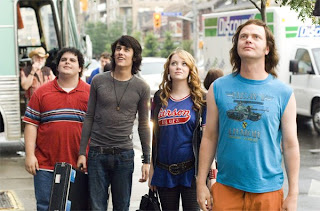The Dreaded “R” Word
 by Kelly Boyce
by Kelly BoyceRejection: (Noun)
1. The act or process of rejecting.
2. The state of being rejected.
3. Something that is rejected.
If rejection is a noun, why does it feel more like a verb? An unwanted action thrust upon you. An action that clings with the tenacity of a shark on a bloody piece of chum, gnawing away at your confidence.
Rejection with its verb-like noun-ness, doesn't travel alone. It surrounds itself with feel-good synonyms like: refusing, spurning, dismissal. Elimination. (By the way - if you say that last one in an exaggerated stage whisper, it sounds way more dramatic.)
Anyone in the entertainment business – heck, anyone anywhere – has experienced rejection in one form or another.

I’ve experienced a year of rejection. Not always outward rejection in the form of a nameless, faceless dear author letter stating, ‘Thanks, but no thanks.’ Rather I seem to be suffering from the more subtle type that comes from almost, but not quite. And I have to say, my usual burgeoning sense of self-esteem has days where it feels a bit chewed over and spat out.
So what do you do when it feels like your career has stalled and you’re banging your head against the proverbial brick wall with nothing to show for it but a whopping old headache? What course of action do you take when a contest judge tells you they don't want your heroine to have a happily ever after, they want her to die miserable and alone?
Well if you’re anything like me, you start looking for validation that rejection happens to everyone. Reminders of what a subjective business you're in. That being told no is only inclusive to the one person doling it out. Granted, it still feels like a kick in the teeth, but more often than not it is just a reminder that things worth having are worth working for. And that the most important thing you can keep stowed in your writer’s toolkit is perseverance.
To prove this point, check out some of these rejections by authors who later went on to show all those naysayers they could do it after all.
Susie Smith , an author of children’s books, has a list of famous rejection letters on her website, as does this link here titled Rotten Rejections. Check out the websites if you need some cheering up, but to get you started, here are a few of my favorites:
 Dr. Seuss - "too different from other juveniles on the market to warrant its selling."
Dr. Seuss - "too different from other juveniles on the market to warrant its selling."Editor of the San Francisco Examiner to Rudyard Kipling - "I'm sorry, Mr. Kipling, but you just don't know how to use the English language."
Mystery writer Mary Higgins Clark recently received a $60 plus million dollar advance on her next five books, but this is what happened when she was sending out her manuscript "Journey Back to Love" in the early 1960s: "We found the heroine as boring as her husband did."
H.G. Wells upon submitting his manuscript, "The War of the Worlds" - "An endless nightmare. I do not believe it would "take"...I think the verdict would be 'Oh don't read that horrid book'."
Crash by J G Ballard - ‘The author of this book is beyond psychiatric help.'
Carrie by Stephen King - 'We are not interested in science fiction which deals with negative utopias. They do not sell.'

One of my favourite stories is John Grisham. He worked 60-70 hours per week as a lawyer, but still managed to squeeze in time in the wee hours of the morning and during courtroom recesses to write his first novel, A Time to Kill. He toiled away for three years on this novel and when it came time to send it out, it was rejected by publisher after publisher. Eventually it was bought by Wynwood Press and given a modest 5,000 copy printing in June 1988. Despite that originally small first print, Mr. Grisham seems to be doing just fine for himself.
And don't even get me started on that little known author J. K. Rowling.
Rejection, much like the sting it delivers, is just a temporary thing.

The "almost there' rejection hurts the most. Because no one can tell you what's "not there" or what you have to do to "arrive." All you know is your still waiting outside that magical door, running in place, hoping you don't die before you get "there."
ReplyDeleteReading about the famous rejections is certainly inspiring. I'd heard of a few of them but some were new to me. :)
ReplyDeleteThanks for those examples, Kelly - LOL! Hindsight being 20/20 vision must have really smarted for those letter writers.
ReplyDeleteKelly, I'm sorry you had a tough year of rejections. If it's any consolation I had some tough rejections myself ;D but you're right - we keep at it because we're writers - that's what we do! I love your examples of famous rejections. As many of us embark on nanowrimo this year I think your article hits the nail on the head! ;)
ReplyDeleteGreat post, Kelly. I'd also suggest Chicken Soup for the Writer's Soul, a great chronicle of writers who persevered and eventually found success. So keep at it, and never never never give up! My philosophy is: keep your mss in play; if it comes back, polish it up and volley it back out to another publisher. Best of luck!
ReplyDeleteFabulous article. And you're right, it really does feel like a verb, an intrusive, know-it-all, smirky verb. *snort*
ReplyDeleteYup, some of the most famous of the famous have been rejected. I still remember the legendary story of Decca rejecting the Beatles because "guitar groups were on the way out." *laughs*
This a wonderful piece! Thanks!
--Chiron O'Keefe
The Write Soul: www.chironokeefe.blogspot.com